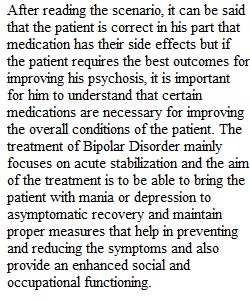


Q Critical Thinking Assignment Read the following scenario. Then read the 8 key questions, and choose 3-4 questions that you think directly relate to the scenario. Clearly state which questions you are exploring, and process how you would respond to the scenario. Do this for all 3-4 questions. You may use pronouns (I, me, you), and you are encouraged to research anything that might help you answer the question. Keep in mind, those that combine their opinions on the key questions with facts that you find will do the best on the assignment. It would be expected that you would find research on the danger of Bi-Polar to self and others (criminality and suicidality), as this might impact how you decide the scenario. It is also expected that for each question, you not only discuss your argument but also other possible perspectives on the question that you considered before making your decision. There should be no less than 3 citations or references, although there is not a maximum number for this assignment. Cite your paper using APA style with a cover page, in-text citations, and a reference page. It is critical that you ultimately take a position on this scenario, either you mandate they be medicated or you opt not to mandate medications. DO NOT STATE THAT YOUR SOLUTION IS TO CONVINCE THEM TO VOLUNTARILY TAKE MEDICATION—THIS IS NOT ONE OF THE OPTIONS. When you take your position, give your reasons for this decision; they should relate to the 3-4 key questions. In order to achieve a high score on this assignment it will also be important to discuss how your decision (and similar decisions) might impact society. Length: At least 4 paragraphs, well written (no grammar, spelling errors). You will lose 2 points for each error that I find, so spell check carefully. If you choose less than 3 ethical questions, your grade will go down substantially. However, do not exceed 4 ethical questions. BE SURE TO REVIEW YOUR RUBRIC FOR MORE SPECIFICS ON HOW YOU WILL BE GRADED. Submit via Blackboard. Worth 200 points.
Q Scenario: You are a Psychologist who has to make a recommendation to the court regarding the mental health and disposition of a patient. The patient, by all accounts is a brilliant young artist, who has made beautiful and highly sought after works of art. Some of the artwork is extremely dark, depicting depression, suicide, and homicide. Some art is less graphic and less violent, but regardless most in the art community see him as brilliant. He states that his best work comes from his emotional inner life. It is clear that he does most of his work when he is a manic state (having had a long standing diagnosis of Bi-Polar I with Psychotic features). Some of his work is a mess, as he slips in to psychosis. Other times he creates beautiful paintings. In the past 5 years, he has been found wandering the streets, incoherent at times after a long phase of mania (this has happened 4 times in 5 years). He was hospitalized with poor hygiene, and had been twice evicted for not paying his rent (despite having the money to do so), he was too disorganized to manage this task. When he was put on medication after each hospitalization, he is more stable but feels unable to create works of art. He refuses to take the medication as he feels it takes away his creative episodes. He is adamant that medications are not what he wants, and feels they are not only damaging to his creativity and they have numerous physical side effects he strongly dislikes. Your recommendation will be binding, if you mandate he take meds it will be forcibly done so for as long as you feel necessary. If you do not mandate medications, it is clear he will not take them and will likely end up hospitalized again. There is no third alternative, you must clearly decide either to place him on medications against his will, or allow him to avoid medications. Q1. Outcomes: What achieves the best short and long-term outcomes for me and all others?
Q Q2. Character: What action best reflects who I am and the person I want to become?Q3. How does respect for freedom, personal autonomy or consent apply?
View Related Questions